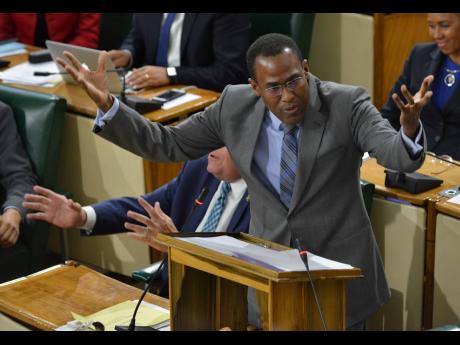Clarke tweaks stimulus
In the face of criticism that his $14-billion tax break was inequitable, Nigel Clarke, Jamaica’s finance minister, gave a staunch defence of his $803-billion Budget but made two concessions raised by the Opposition in order to remove distortionary effects.
Consequently, the Government will impose a flat stamp duty of $100 for documents or parcels for transactions under $500,000 and $5,000 above that amount. Second, the Government will allow businesses that earn less than $10 million in revenue to remain registered with the tax authorities. Without the revision, these businesses, some of which may want to remain, would be struck off the registry.
“We have given credit where credit is due, corrected the record to ensure accuracy and fairness, and accepted the constructive suggestions for improvement offered by the Opposition,” stated Clarke in one of his more conciliatory remarks in his closing presentation of the 2019-2020 Budget Debate at Gordon House on Wednesday.
Last week, Opposition Spokesman on Finance Mark Golding ridiculed the Government’s $14-billion stimulus package, charging that it provides incentives mainly for the rich. Clarke rebutted those claims as opinion rather than fact. Half of Clarke’s two-and-a-half-hour speech defended the stimulus package, arguing that most Jamaicans would benefit.
“To be clear, the ad valorem calculation for Betting and Gaming tickets will remain unchanged,” he said.
Clarke also explained that the concessions are aimed at removing a distortion relating to persons applying for titles below $500,000 and will affect a small number of individuals. Without the change, Clarke said, it would have resulted in those persons paying higher taxes despite an overall reduction in taxes for the rest of applicants.
The finance minister also revealed that he would not reduce GCT, as suggested by businessmen like John Mahfood, as the economy was still too fragile.
“You don’t start your tax-reduction journey with the most important tax,” he said about the island’s debt-to-total-output GDP, which hovers at 96 per cent, its lowest level in nearly two decades.
“Reduction of GCT was considered, but analysis suggested that this would have less of an impact on the Jamaican economy than removing distortionary transaction taxes,” Clarke said.

